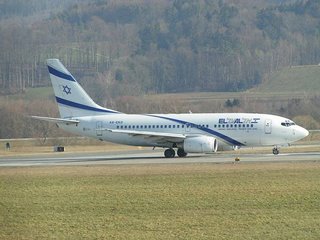
As likely everyone knows, liquids are now banned on US flights.
I still think its a very knee-jerk reaction.
I also think seperate lines for Muslims, Arabs or whomever is an even worse knee-jerk reaction.
Boston Globe columnist Jeff Jacoby examines Israel's national airline that has been free of terrorist attacks for nearly three decades.
Nearly five years after Sept. 11, 2001, US airport security remains obstinately focused on intercepting bad things -- guns, knives, explosives. It is a reactive policy, aimed at preventing the last terrorist plot from being repeated. The 9/11 hijackers used box cutters as weapons, so sharp metal objects were barred from carry-on luggage. Would-be suicide terrorist Richard Reid tried to ignite a bomb in his shoe, so now everyone's footwear is screened for tampering. Earlier this month British authorities foiled a plan to blow up airliners with liquid explosives; as a result, toothpaste and cologne have become air-travel contraband.
[...]
Israeli airport security, much of it invisible to the untrained eye, begins before passengers even enter the terminal. Officials constantly monitor behavior, alert to clues that may hint at danger: bulky clothing, say, or a nervous manner. Profilers -- that's what they're called -- make a point of interviewing travelers, sometimes at length. They probe, as one profiling supervisor told CBS, for ``anything out of the ordinary, anything that does not fit." Their questions can seem odd or intrusive, especially if your only previous experience with an airport interrogation was being asked whether you packed your bags yourself.
Unlike in US airports, where passengers go through security after checking in for their flights and submitting their luggage, security at Ben Gurion comes first. Only when the profiler is satisfied that a passenger poses no risk is he or she allowed to proceed to the check-in counter. By that point, there is no need to make him remove his shoes, or to confiscate his bottle of water.



No comments:
Post a Comment